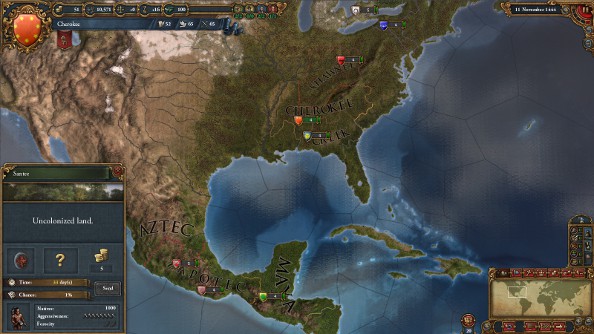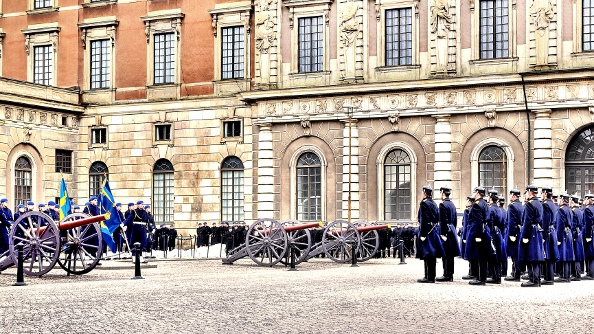In the evening, after a day of multiplayer warfare in EU IV, we’re taken on a tour of Sweden’s Royal Armory. It’s a fascinating place, with history so close you can almost touch it. It is also a mausoleum to an unlikely empire that briefly rode the tide of history to preeminence in northern Europe. In one corner under soft lights stands a dashing uniform of dark blue wool, with a long night-colored cloak, and tall, narrow boots. Charles XII died in that uniform on a cold night in Norway in 1718, inspecting some of his siege lines during his doomed effort to stave off the end of the Swedish Empire. It remains exactly as it was at the moment of his death, spattered with the mud of the trenches.
There’s a romanticism to this place, and it’s one that Europa Universalis and many games about history share. They tell stories of how nations rise to power, how they struggle with their neighbors and conquer new, unknown lands. It’s right there in the name: the Europa Universalis series is the story of how the West conquered the world and came to dominate the modern era.
That story can be glorious, but it is just as often squalid and vicious, and sometimes I wonder at what our love of these games says about those of us who play them.
Over lunch one afternoon, Paul Dean described how he’d annihilated the Finnish people as the ruler of Sweden. “They kept rebelling and I was getting a bit sick of it so I just went click-click-click and converted all their provinces to Swedish,” he said with a slight smile. “I actually got a message that said the remaining Finns had become second-class citizens and were basically forced into serfdom while they had ceased to exist as an ethnicity. So that got sorted.”
My own Ottomans spent much of the game doing the same thing. You can slowly convert the ethnicities of different provinces, just as you can send missionaries to bring the population over to your chosen religion. It just takes a massive investment of administrative points, a pool of government capacity that can be spent on new technologies, improvements to national stability, or ethnic realignment.
But what does this really represent, if not ethnic-cleansing? I made the Balkans and northern Greece to into Muslim and Turkish territories. The Albanian and Greek subjects there were too restive, too grudging in their allegiance to the Ottomans, so they had to go. There are times when I feel like I am playing Brenda Romero’s Train, in which you discover you’ve been playing the part of an Eichmann and your rail network is taking people to the death camps. Except in a lot of strategy games, like EU IV, you are basically rewarded with greater efficiency and obedience within your empire.

I ask EU IV’s project lead, Thomas Johansson later whether it troubles him that the games that he makes, and that I play, are implicitly cheering that triumph, the crushing of the weak beneath the will of the powerful.
“It’s a difficult question,” he admits. “The idea strikes you every once in a while. …We make games that are supposed to be entertaining, about exciting moments in history. But a lot of people suffered quite a lot. And there’s not really any good answer for that, or good way to deal with that.”
Some of the issues you can frame as being design problems. For instance, colonization in EU IV involves sending colonists and settlers to empty territories on the map and bringing them into the imperial fold. They are uninhabited regions because you can’t colonize other political entities. The game’s rules don’t allow it. The irony here is that this is roughly how European nations saw it: you weren’t colonizing Iroquois land, you were taking advantage of uninhabited wilderness. It’s convenient from a game design standpoint, but Johansson and the rest of the development team keep thinking about other ways to model it.
“We’ve talked about actually making a new colonization system where you can have colonization and still have lots of nations in South America, so you have more of a diplomatic game to play between different tribes,” he tells me. “ We have an idea that keeps floating about of a new colonization model where you can colonize actual nations. We wouldn’t have to leave these empty swaths. The problem is that when it comes to certain nations, like the South American nations, you are so far behind that history isn’t really on your side, right?”

Johansson isn’t blind to the moral hazards of historical strategy gaming, though he doesn’t think the morality comes from the games themselves. He points to World War II games, which are some of the most problematic, to show how trying to simulate warfare in the 1940s ends up glorifying the Wehrmacht.
“If you translate it into a game, the Germans were fairly poor at mass producing tanks, but fairly good at training troops. Then you have the American army which produced lots and lots of tanks. So you have a situation where a few Germans fight lots and lots of people. And in the Western narrative, that’s the way you’re supposed to win!” he explains. “You’re supposed to be few guys against lots of guys. And that makes people want to play the Germans. And they will want to pretend that nothing bad ever happens, which is the creepy part. Games don’t make it this way. Rather, games live off the fact that people see history that way.”
At least Paradox games tend to be more honest about the backdrop of the game you’re playing. Crusader Kings 2 is aware of its sadism and cruelty, as you sacrifice children and lovers as pieces in the game of thrones. EU IV doesn’t make you go crush out ethnic and religious identities. You don’t have to play the game that way. But there are cold-blooded incentives to do so.
And what it illustrates, with chilling effectiveness, is how quickly morality goes by the boards when you see things from the imperialist perspective. You may not want to stamp out a weaker neighbor, but someone else might, and they will be stronger for doing it. You might be willing to leave a rebellious population in peace, but they could sink you if they rise up at the wrong moment. You don’t have to colonize someone else’s country, but it’s going to happen one way or another, so you might as well be the one to benefit. Little by little you turn into a brutal tyrant, and each brick in the road to hell comes with a neat rationalization.

But as we leave the Royal Armory, I wonder if most strategy games don’t define success a little too narrowly. Because the story Paradox’s games tell, from Crusader Kings through the World War II series Hearts of Iron, does not have a happy ending for most of the players. It is a saga of growing ambition and power, where the stakes just keep getting higher. And the endgame is world war, with its millions of dead and devastating economic cost.
As we file out into a beautiful spring evening, we finally cast off the Machiavellian masks we’ve been wearing all day and turn back into a bunch of gaming and history nerds. We talk about our families, favorite books and TV shows, and, of course, games. It occurs to me that Stockholm was spared the horrors of the 20th century, that this is a city that was never carpet-bombed, and whose citizens don’t all have relatives who were sent off to fight somewhere in Europe or Asia.
By the standards of a Paradox game, Sweden turned in a middling historical performance. It lost its status as a great power, as well as its northern empire. Charles XII was its last great imperial ruler, and he died trying to hold onto that status. As we walk to dinner through a city that has known over a century of peace, it seems like Sweden may have come out ahead of most of history’s “winners”. While I will probably never tire of playing the part of a Henry II or Bismarck, I wonder if strategy games don’t leave us with a little too much sympathy for the devil. Living in peace and freedom is never a victory condition, but for those of us who can only play at being kings and presidents, it’s the only one that matters.
A number of other writers attended the event, and wrote about their own experiences. Here are some additional reports from the EU IV session in Stockholm.
- Adam Smith – Rock, Paper, Shotgun (Part 2)
- Fraser Brown – Destructoid
- Joe Robinson – Strategy Informer
- Paul Dean – The Average Gamer
